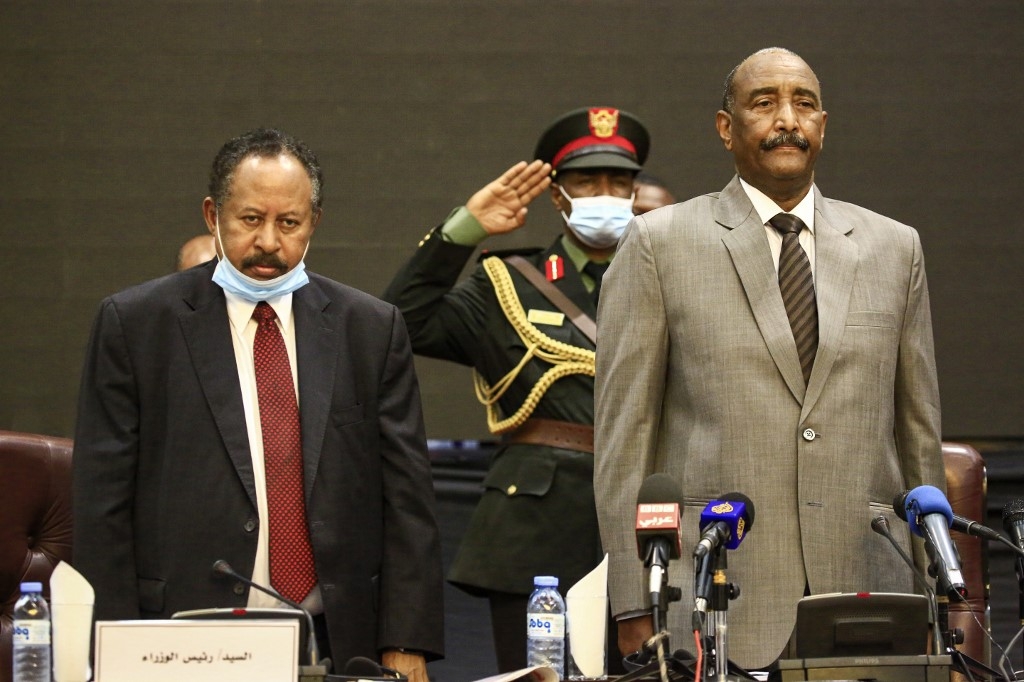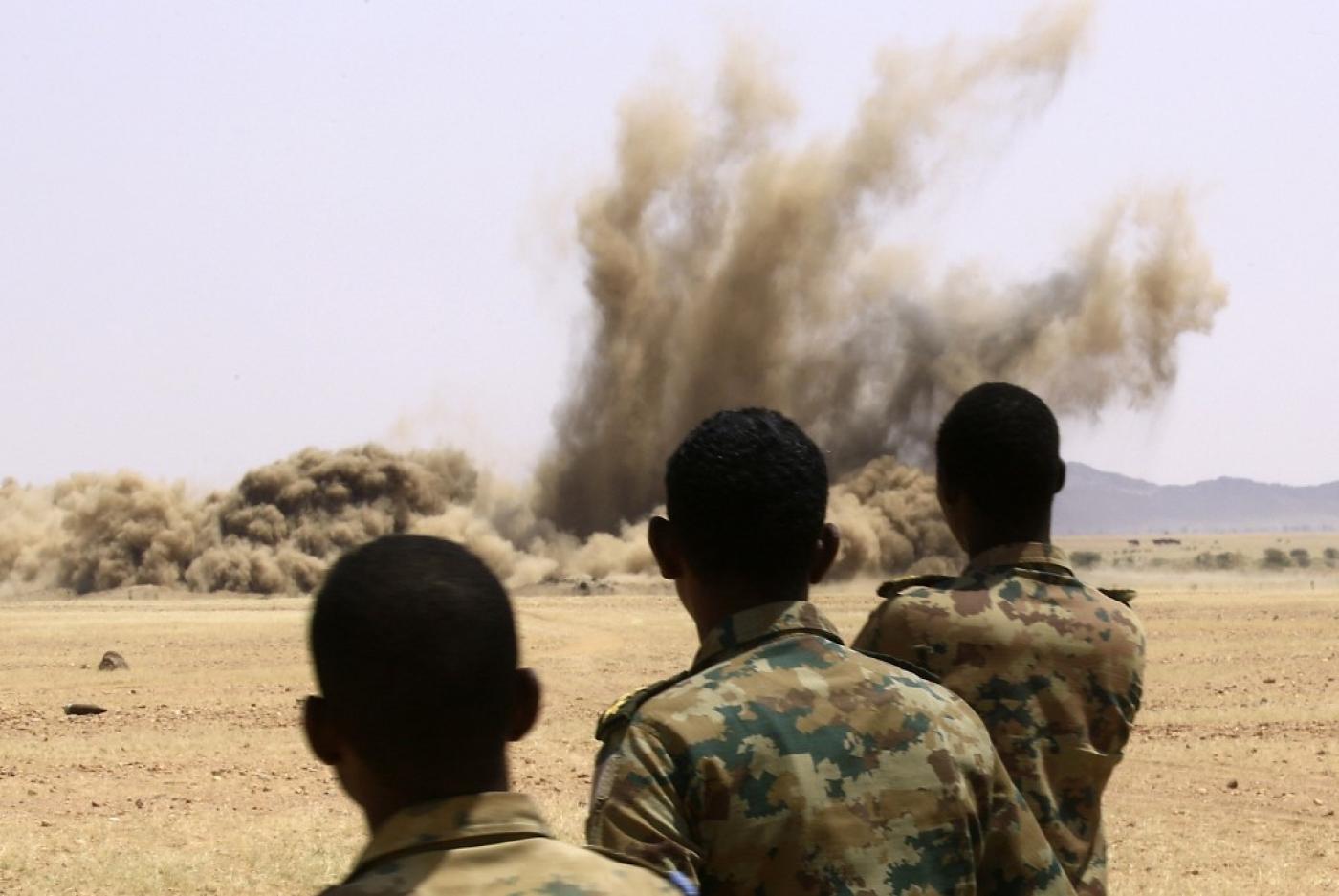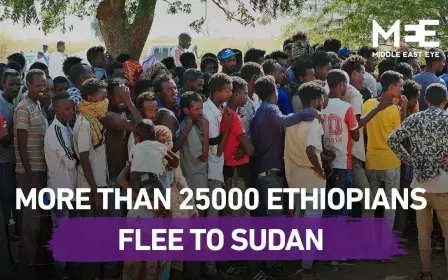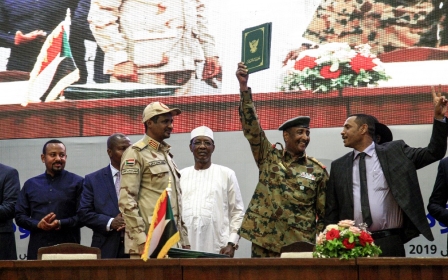Sudan's civilian rulers fear new body's powers may derail democracy hopes

The risks of a military coup in Sudan appear to have heightened amid disputes between the civilian and military elements of the transitional government following the creation by the country's military chief of a new body with broad powers.
Several civilian elements, including the prime minister and the Forces of Freedom and Change (FFC) alliance, have rejected the powers conferred to the new Transition Partners Council (TPC) and urged General Abdel Fattah Al-Burhan to review his decision.
'The powers given to the TPC are above its mandate and violate the constitutional declaration as well as confiscating the powers of the upcoming legislative assembly'
- Faisal Mohammed Salih, government spokesman
Burhan heads Sudan’s Sovereign Council, a military-civilian body established in August 2019.
It is Sudan’s highest executive authority and is overseeing a fragile three-year transition to civilian rule after the April 2019 overthrow of former President Omar al-Bashir.
Burhan issued a presidential decree last week to form the TPC, which would comprise the FFC, the Sudanese Revolutionary Front (SRF), who are a coalition of rebel forces, the military component of the transitional government and the council of ministers.
New MEE newsletter: Jerusalem Dispatch
Sign up to get the latest insights and analysis on Israel-Palestine, alongside Turkey Unpacked and other MEE newsletters
The body is formed of 29 members, including 13 from the FFC, seven from the SRF, six from the military, along with two other community leaders from Eastern Sudan.
According to the decree, the TPC will have the powers of directing the transitional period and to serve the high interests of Sudan, resolving any differences among the government partners and helping to implement a recently signed peace agreement with the rebels.
Rejecting the move, Prime Minister Abdalla Hamdok said Burhan had overstepped his prerogatives by conferring excessive powers on the new body.
Burhan defended his decision on Wednesday, saying both the military and civilian transitional rulers have so far failed to fulfil the aspirations of the Sudanese people.
Breach of constitution
The heart of the current disputes between the civilian and military is over the changes to the ruling institutions and how to integrate the rebel movements that signed a peace deal with the transitional government in October in Juba.
There was already tension following the signing of the Juba deal, which was rejected by some members of the FFC as well as some of the rebels, but disputes escalated following the arrival of rebel leaders in Khartoum last month and reached their peak with Burhan's decision to form the TPC.
'It’s a conspiracy by the military in order to seize power and against the August power-sharing deal'
- Alfatih Youssef , Sudanese Professionals Association
Government spokesman Faisal Mohammed Salih said in a statement on Friday that Burhan’s decree contradicted the “constitutional declaration” signed in August last year between pro-democracy activists and the military generals.
Meanwhile, rebel non-signatories of the Juba deal, including the Sudan People’s Liberation Movement-North (SPLM-N) led by Abdul Aziz Alhilu and the Sudan Liberation Movement, led by Abdul Wahid al-Nur, also rejected the TPC.
Other tensions between the civilian and military leadership include the dissolution of state-owned companies controlled by the army, the restructuring of the military, militias and security organs, along with the recent normalisation deal with Israel.
The military, which is close to Saudi Arabia, the UAE and Egypt, had pushed for the move, while Hamdok had opposed it.
Peace deal
The Juba peace deal covers the five states in Darfur, South Kordofan and the Blue Nile, and armed conflicts in central, northern and eastern Sudan.
The agreement included nine protocols covering power sharing, wealth sharing, humanitarian access to all conflict areas, security arrangements, justice - including cooperation with the International Criminal Court (ICC), land ownership, the return of refugees and IDPs to their home lands, reconciliation and the compensation of the war victims.
The main rebel factions who signed the deal were the SPLM-N headed by Mali Agar, the Justice and Equality Movement (JEM), the Sudan Liberation Movement faction under the leadership of Minni Minawi (SLM-MM), and the SLM-Transitional Council, among other minor groups.
The power-sharing deal gave the rebels 25 percent of the make-up of the cabinet (Council of Ministers) and of the upcoming legislative assembly.
Following Burhan's decree, the Council of Ministers officially rejected the move in a statement, arguing the TPC's mandate went beyond what they had agreed upon when they signed the peace deal.
“This [Transition Partners] council is [only] supposed to be a body for consultations and conflict resolutions between the four levels of power including the FFC, military, cabinet and the rebels of SRF," the Council of Ministers said.
Government spokesman Salih said that the vague language of the decree was intentional in order to expand the power of the TPC.
“The powers given to the TPC are above its mandate and violate the constitutional declaration as well as violating and confiscating the powers of the upcoming legislative assembly, including the monitoring, counting etc," he said.
The FFC also rejected the powers of the new council, stressing that it should only be for consultations between the government institutions and the new peace partners in order to decide the best way to implement the peace deal.
The National Umma Party (NUP) and Sudanese Congress Party (SCP) also rejected the presidential decree, calling for its immediate review.
'Conspiracy by the military'
The Sudanese Professionals Association (SPA), which led the protests against Bashir, has threatened to organise protests against the TPC.
“We are looking suspiciously at the formation of this council, including its powers, which aim at aborting the democratic transformation and the civilizing of the state in Sudan,” SPA leading member Mohamed Alfatih Youssef told MEE.
“It’s a conspiracy by the military in order to seize power and against the August power-sharing deal.”
The Grassroots Resistance committees have also rejected the formation of the TPC.
In multiple statements, its committees in Khartoum, Atbara, Port Sudan and other cities called for nationwide protests to coincide with the second anniversary of the 2018 Sudanese revolution on 19 December.
The protests would be to express rejection of the government's performance, including the violations of the constitution by the army, its failure in improving the economic crisis and the delay in the formation of a legislative assembly.
Sovereign Council member Aisha Musa al-Saeed also said she considered Burhan's presidential decree as a coup against the August 2019 constitutional declaration.
Issues can be resolved
However, Sudanese Revolutionary Front leaders have stressed the importance of the TPC, accusing some civilian elements of attempting to weaken the rebels' representation and the implementation of the peace deal.
Leading SRF member Altoum Hajo said that the council was the only way to provide real and equal power-sharing for the rebels, as well as to monitor the implementation of the peace agreement.
'We see that history is repeating itself and the elites of the centre in Khartoum want again to exclude the other parts of the country, especially those affected by the war, in the political representation and wealth sharing'
- Altoum Hajo, Sudanese Revolutionary Front
“We see that history is repeating itself and the elites of the centre in Khartoum want again to exclude the other parts of the country, especially those affected by the war, in the political representation and wealth sharing," he said.
"This will reproduce the old state that gives the privileges of the country to a specific political class.”
Prominent FFC member Haidar Alsafi downplayed the disputes, describing them as a little misunderstanding that could be solved with more consultations between the different stakeholders.
Alsafi told MEE that “intensive contacts and talks are underway between the FFC, Council of Ministers, military and the SRF to resolve these differences as soon as possible”.
“We have a lot of economic problems, the spread of the coronavirus and a lot of challenges, so we are in no need to exaggerate the current differences,” he said.
'Coup against the constitution'
Sudanese legal expert Mohamed Abdul Salam told MEE he considered the decree as a constitutional violation as it was based on an amendment of the constitutional declaration governing the transitional period.
The professor of law at Khartoum University stressed that amending the constitutional declaration was an exclusive right of the legislative assembly that has not been formed yet due to political differences.
'Unless the FFC reforms itself and strongly supports the civilian rule, and the democratic transformation, the coup will become a reality. '
- Alhaj Warrag, a Sudanese political analyst
“This is a real violation and coup against the constitution because the Sovereign Council, as well as the Council of Ministers and the rebels, have no right to change the constitution, he said.
"The only body that has this right does not exist so far and this is one of the main crises in this transition.
"Unless the legislative assembly is formed, the political and constitutional fragility and violations will continue.”
Alhaj Warrag, a Sudanese political analyst, believes that the move is part of a conspiracy between some of the military generals and old state supporters of political Islam to remove the Hamdok from the scene.
“They are playing the same game as dictators everywhere, they are intentionally creating a lot of political and economic troubles in order to pave the way for protests and then a coup against the civilians in the transitional government,” he said.
“Unless the FFC reforms itself and strongly supports the civilian rule, and the democratic transformation, the coup will become a reality.
"Regardless of the weak performance of the prime minister, or the entire Council of Ministers, they are symbolically representing the rights of civilians to participate in the transitional period, and help engineer the future.”
Middle East Eye delivers independent and unrivalled coverage and analysis of the Middle East, North Africa and beyond. To learn more about republishing this content and the associated fees, please fill out this form. More about MEE can be found here.





